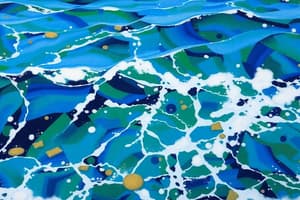Podcast
Questions and Answers
What role do oceans play in relation to carbon dioxide?
What role do oceans play in relation to carbon dioxide?
- They release carbon dioxide into the atmosphere.
- They absorb and store carbon dioxide. (correct)
- They have no effect on carbon dioxide levels.
- They produce carbon dioxide.
How does ocean water temperature change from the equator to the poles?
How does ocean water temperature change from the equator to the poles?
- It increases towards the poles.
- It decreases as it approaches the poles. (correct)
- It fluctuates greatly.
- It remains constant.
Which statement accurately describes the heat capacity of ocean water compared to air?
Which statement accurately describes the heat capacity of ocean water compared to air?
- Ocean water has a very high heat capacity. (correct)
- Ocean water heats up and cools down faster than air.
- Ocean water has a lower heat capacity than air.
- Ocean water does not retain heat.
At what temperature does ocean water typically freeze?
At what temperature does ocean water typically freeze?
What primarily affects the density of ocean water?
What primarily affects the density of ocean water?
Why does cold, salty water sink in the ocean?
Why does cold, salty water sink in the ocean?
What is the primary reason ocean water is not suitable for drinking?
What is the primary reason ocean water is not suitable for drinking?
Which of the following is true about the freezing point of ocean water compared to freshwater?
Which of the following is true about the freezing point of ocean water compared to freshwater?
How does salt primarily enter the oceans?
How does salt primarily enter the oceans?
Which of the following gases is NOT typically found dissolved in ocean water?
Which of the following gases is NOT typically found dissolved in ocean water?
What process concentrates salt in ocean waters over time?
What process concentrates salt in ocean waters over time?
What is the main chemical component of ocean water?
What is the main chemical component of ocean water?
Which chemical is important for plant growth that can affect ocean life when it runs off into the ocean?
Which chemical is important for plant growth that can affect ocean life when it runs off into the ocean?
What phenomenon occurs when nitrogen-rich runoff stimulates excessive growth in ocean plants?
What phenomenon occurs when nitrogen-rich runoff stimulates excessive growth in ocean plants?
Flashcards
Salinity
Salinity
The amount of dissolved salt in water.
Evaporation
Evaporation
The process where water changes from a liquid to a gas, leaving behind dissolved salts.
Sodium Chloride
Sodium Chloride
The main chemical in ocean water, composed of sodium and chloride.
Ocean Water Chemicals
Ocean Water Chemicals
Signup and view all the flashcards
Nitrogen Pollution
Nitrogen Pollution
Signup and view all the flashcards
Dissolved Gases in Ocean Water
Dissolved Gases in Ocean Water
Signup and view all the flashcards
Deep Ocean Water
Deep Ocean Water
Signup and view all the flashcards
Surface Ocean Water
Surface Ocean Water
Signup and view all the flashcards
Carbon Sinks
Carbon Sinks
Signup and view all the flashcards
Ocean Water Temperature
Ocean Water Temperature
Signup and view all the flashcards
High Heat Capacity of Ocean Water
High Heat Capacity of Ocean Water
Signup and view all the flashcards
Freezing Point of Ocean Water
Freezing Point of Ocean Water
Signup and view all the flashcards
Ocean Water Density
Ocean Water Density
Signup and view all the flashcards
Density
Density
Signup and view all the flashcards
Study Notes
Ocean Water Properties
- Ocean water covers about 97% of Earth's water.
- Ocean water is salty due to dissolved salt (sodium chloride), carried from land by rain and rivers.
- Ocean water also contains other minerals like magnesium, sulfate, calcium, and potassium.
- It holds dissolved gases like nitrogen, oxygen, and carbon dioxide.
- Excessive nitrogen runoff from fertilizer can harm marine life.
- Oceans absorb and store CO2, acting as carbon sinks.
- Ocean water temperature varies, highest at the equator, coldest near the poles.
- Ocean water has a high heat capacity: it takes a long time to heat and cool down.
- Ocean water freezes at about 28°F, lower than freshwater (32°F).
- Salinity affects freezing point: more salt, lower freezing point.
- Ocean water density depends on temperature and salinity.
- Denser water (colder, saltier) sinks, less dense water floats.
Studying That Suits You
Use AI to generate personalized quizzes and flashcards to suit your learning preferences.




